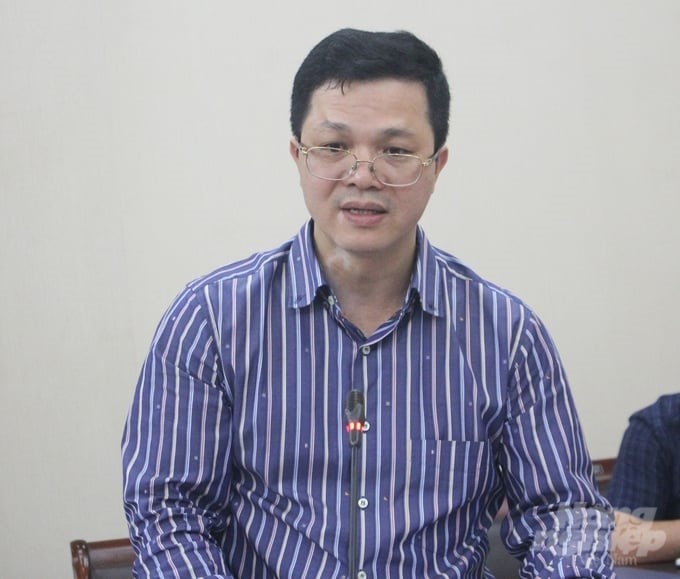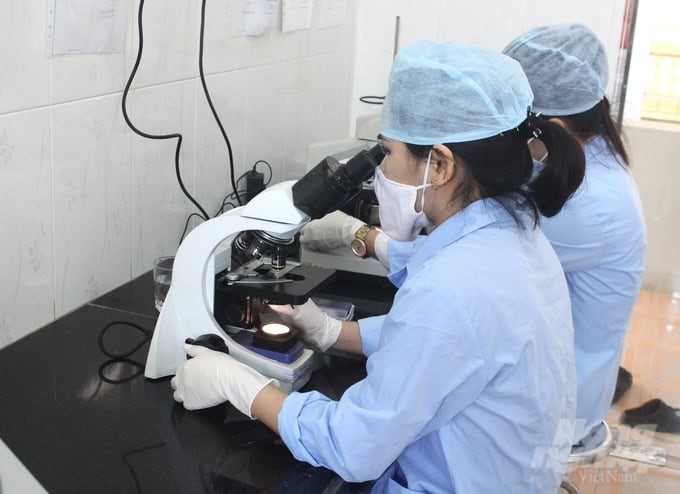May 20, 2025 | 06:21 GMT +7
May 20, 2025 | 06:21 GMT +7
Hotline: 0913.378.918
May 20, 2025 | 06:21 GMT +7
Hotline: 0913.378.918
Mr. Nguyen Van Long, Director of the Department of Animal Health, said that there will be some new points in the draft Circular amending and supplementing a number of articles of circulars regulating the quarantine of terrestrial animals and animal products (referred to as the new Circular), which is expected for promulgation.
Specifically, in the past, the Department of Animal Health was assigned to perform the tasks of inspection and quarantine while also checking the quality of animal feed and aquatic feed. However, currently, the Department of Animal Health only performs the quarantine task. Therefore, the new Circular will amend, supplement, and abolish a number of articles and forms accordingly.

According to Mr. Nguyen Van Long, Director of the Department of Animal Health, the draft new Circular supplements testing for Salmonella spp. and E. coli indicators because these are two microorganisms that cause disease in both animals and humans. Photo: Trung Quan.
Second, through the process of directing practical production, it is realized that supplementing a number of indicators on quarantine and microorganisms capable of causing diseases in humans and animals is necessary. Of which, testing for the Newcastle virus indicator causing disease in poultry is added because Vietnam allows importing live poultry from Laos according to the Vietnam-Laos border trade agreement.
In addition, supplement testing for Salmonella spp. and E. coli indicators, which are two microorganisms that cause disease in both animals and humans. This supplementation is based on the legal basis of the Law on Veterinary Medicine, international regulations, and domestic and international scientific research results that have proven that Salmonella spp. and E. coli are two pathogens. Besides, tests in practice have also detected these microorganisms on imported products, and in recent times, there has been food poisoning caused by Salmonella spp.
Aside from that, based on disease developments, the Department of Animal Health decides on disease indicators for testing according to the regulations and recommendations of the World Organization for Animal Health (WOAH/OIE).
Third, supplement an appendix on sampling to ensure openness, transparency, and details to facilitate understanding and implementation by all organizations and individuals.
Fourth, regarding administrative procedure reform, the term of quarantine certificates for animals and animal products for export will be extended from 60 days to 180 days (3 times).
The regulation on combining samples for testing for domestic transportation quarantine (5 samples combined into 1 sample for testing) also helps reduce sample testing costs by 80%. At the same time, no additional administrative procedures arise.
In particular, supplement the 8-digit HS code of goods to facilitate the application of information technology, digital transformation in quarantine work, and traceability of imported shipments into Vietnam.

According to the draft new Circular, the term of quarantine certificates for animals and animal products for export will be extended from 60 days to 180 days. Photo: Trung Quan.
The new Circular also clearly stipulates the transition content. Specifically, dossiers of quarantine registration and declaration, registration for inspecting and confirming the quality of animal feed and aquatic products of imported animal origin, and dossiers requesting exemption from state inspection on the quality of animal feed and aquatic products of imported animal origin that are submitted before the new Circular takes effect shall comply with the provisions of law at the time of submission.
For animal feed and aquatic products of imported animal origin for which the Department of Animal Health has had a written confirmation of exemption from state quality inspection before the new Circular takes effect, the exemption shall be implemented until such written confirmation expires.
Translated by Huyen Vu Thu

(VAN) Dong Thap farmers attained an average profit margin of 64% during the summer-autumn 2024 crop (first season), while An Giang and Kien Giang farmers followed with 56% and 54%, respectively.

(VAN) As a doctoral student doing research on renewable energy and electrification at Harvard University, the author shares his musings on electricity, nature, and countryside memories.

(VAN) The decree on Extended Producer Responsibility (EPR) ensures transparent management and disbursement of support funds, avoiding the creation of a “give-and-take” mechanism.

(VAN) Hue City rigorously enforces regulations regarding marine fishing and resource exploitation, with a particular emphasis on the monitoring of fishing vessels to prevent illegal, unreported, and unregulated (IUU) fishing.

(VAN) Hanoi People's Committee has issued a plan on reducing greenhouse gas emissions in the waste management sector with 2030 vision.

(VAN) Vietnam's draft amendment to Decree No. 156 proposes a mechanism for medicinal herb farming under forest canopies, linking economic development to population retention and the sustainable protection and development of forests.

(VAN) In reality, many craft village models combined with tourism in Son La have proven effective, bringing significant economic benefits to rural communities.